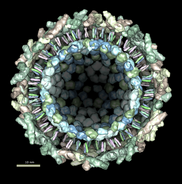
Gene therapy has become one of the most researched fields with the future potential of becoming the most common therapy used to treat people with all kinds of diseases. It is no different for HIV treatment. Among all the HIV-AIDS related research going on in all areas, one of the most important is gene therapy. Researchers at UC-Davis have found a new type of gene therapy that might alleviate or even prevent the effects of HIV. In current gene therapy methods, stem cells are removed from the blood or bone marrow and genetically altered to produce HIV-resistant CD-4s and are then reintroduced into a person. However, it is necessary to destroy all the CD-4 producing cells in the body are already infected or are at risk, a highly toxic and dangerous procedure. CD-4 are immune system Tcells that produce the receptor CCR5 which the HIV virus uses in order to enter the cell (see above picture).
Luckily researchers at UC-Davis have created a hybrid gene delivery device, a vector, that does not require the r emoval of cells from the body. In so doing, they took interfering RNA, a natural gene splicing molecule that interferes with gene expression, inserted it into an emptied Sindbis virus (an arbovirus of the togaviridiae family that causes sindbis fever, see left) and attached monoclonal(monospecific) antibodies to the surface so that this vector would only interact with the immune system cells that need to be genetically altered.
emoval of cells from the body. In so doing, they took interfering RNA, a natural gene splicing molecule that interferes with gene expression, inserted it into an emptied Sindbis virus (an arbovirus of the togaviridiae family that causes sindbis fever, see left) and attached monoclonal(monospecific) antibodies to the surface so that this vector would only interact with the immune system cells that need to be genetically altered.
This vector was tested in a series of experiments on mice in which they first had to prove that the vector would deliver the ingredients to the CD4 cells and inhibit their production of CCR5. In a second experiment, they injected the gene therapy into mice with immune cells and two weeks later, the CD4 cells in the mice no longer had CCR5 receptors and were very resistant to HIV infection.The therapy still has a long way to go in order to be tested in humans but so far so good!
http://www.aidsmeds.com/articles/hiv_gene_therapy_1667_17213.shtml
No comments:
Post a Comment